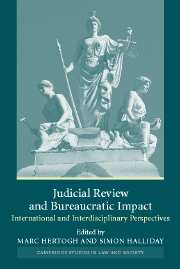Book contents
- Frontmatter
- Contents
- Acknowledgments
- Notes on the contributors
- Introduction
- Part One Conceptual and methodological issues
- Part Two International case studies
- 4 Impact studies in the United Kingdom
- 5 The politics of soft law: how judicial decisions influence bureaucratic discretion in Canada
- 6 The operation of judicial review in Australia
- 7 Legalising the unlegaliseable: terrorism, secret services and judicial review in Israel 1970–2001
- 8 Implementing court orders in the United States: judges as executives
- Part Three The future of judicial review and bureaucratic impact
- Bibliography
- Index
7 - Legalising the unlegaliseable: terrorism, secret services and judicial review in Israel 1970–2001
from Part Two - International case studies
Published online by Cambridge University Press: 29 July 2009
- Frontmatter
- Contents
- Acknowledgments
- Notes on the contributors
- Introduction
- Part One Conceptual and methodological issues
- Part Two International case studies
- 4 Impact studies in the United Kingdom
- 5 The politics of soft law: how judicial decisions influence bureaucratic discretion in Canada
- 6 The operation of judicial review in Australia
- 7 Legalising the unlegaliseable: terrorism, secret services and judicial review in Israel 1970–2001
- 8 Implementing court orders in the United States: judges as executives
- Part Three The future of judicial review and bureaucratic impact
- Bibliography
- Index
Summary
INTRODUCTION
Courts in liberal democracies are often described as the guardians of human rights. Hardly anyone would argue against the proposition that one of the primary roles of courts in a democracy – if not their most important role – is to defend basic human rights. The question as to whether and to what extent courts manage to fulfil this constitutional role in reality remains, however, a much debated issue. The ability of courts to protect human rights is even more questionable when faced with situations of national emergency. There, the danger of a widening gap between high judicial rhetoric and the tough reality of abusing human rights ‘on the ground’ is constant.
In the current paper I deal with the behaviour of judicial institutions and the impact of their decisions in a situation of national emergency. The case study concerns the rulings of the Israeli Supreme Court in regard to the use by Israeli security services of torture during the interrogation of detainees suspected of hostile terrorist activity (HTA) between 1970 and 2001. The purpose of the paper is to present the different kinds of reaction of the Court to petitions regarding interrogation procedures during these years, and to examine the impact of each judicial doctrine on the procedures of the secret services and on the civil rights of detainees.
I will start by describing the institution of the Supreme Court and its general practices with regard to judicial review.
- Type
- Chapter
- Information
- Judicial Review and Bureaucratic ImpactInternational and Interdisciplinary Perspectives, pp. 190 - 220Publisher: Cambridge University PressPrint publication year: 2004
- 3
- Cited by

